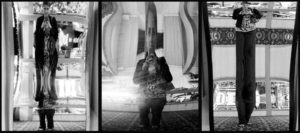Sunday morning I got up early and drove about an hour down I-95 to hear Rachel Held Evans preach at Christ Church in Greenwich, Connecticut, where she was speaking as a part of their very cool Courage and Faith series. Her sermon came from the story of Jesus healing the blind man in John 9. It is one of the stories from the gospels that most intrigues me beginning with the way the disciples start talking about the guy as if he were some sort of prop for their theological inquisitiveness: “Rabbi, who sinned, this man or his parents, that he was born blind?” I halfway expect the man to say, “Hello—I may be blind, but I can hear you. Sitting right here.”
Rachel did a great job with her sermon—I took good notes—and her words sent my mind places her homily didn’t go. I went back to my ongoing fascination with what the gospel writers say and what they leave out. This story goes on for a whole chapter, and covers some time as well. The man keeps going back and forth between the authorities, his family, and Jesus, then back to the authorities. And we never know his name.
After church, Rachel spoke more informally in the chapel, and talked a little about the book she is writing currently that has to do with how we look at the Bible, and she said,
Because the Bible is the Bible, we get talked out of our intuitive understanding of what genre of literature we are reading.
In the margin of my notebook I wrote three questions: How did they remember the story? How long did it take to make meaning out of the moment? What sent them back looking for it?
Those aren’t the only things I wonder. John’s gospel didn’t become an actual thing for sixty or seventy years after the man received his sight. What made this story one of the ones they remembered? How did they get the quotes from his meetings with the authorities? And, as I most always wonder when I read the gospel stories, with what kind of tone did he deliver lines like, “I have told you already, and you would not listen. Why do you want to hear it again? Do you also want to become his disciples?”
Over the past several weeks, I have immersed myself in “The Art of . . .” series by Graywolf Press. I’ve almost gotten through all these little gems on writing. The one I finished the day after I drove to Greenwich was The Art of History: Unlocking the Past in Fiction and Nonfiction by Christopher Bram. Rachel’s words made me think of some things he said about how we look at the past. First he said,
“The past is a foreign country,” L. P. Hartley famously wrote in The Go-Between: “they do things differently there.” . . . We experience this historical difference most keenly through details, the odd objects or striking moments or alien bits of behavior that snap another world to life. (35)
And then,
I believe the past is different but similar enough for us to see ourselves reflected there. . . . We see ourselves new in the fun-house mirror of history. (56)
In the margins, I wrote another question: Can we say we see ourselves new in the fun-house mirror of scripture?
We remember stories—Bible stories, stories from literature, stories about our family and friends that we lived through or have heard about—because that is how we remember who we are, who God is, what we all mean to each other. Maybe they kept telling the story because of the disciples’ question about the cause of the man’s disability. In recent days, I have come to remember this story differently because of the way my friend Kenny tells it. The change has to do with punctuation. As much as I like this story, one verse—Jesus’ answer to their question—has been a bit of stumbling block because it reads:
“Neither this man nor his parents sinned; he was born blind so that God’s works might be revealed in him. We must work the works of the One who sent me . . . .
Kenny offers a different way of punctuating that offers a different way to remember:
“Neither this man nor his parents sinned; he was born blind. (PERIOD) So that God’s works might be revealed, we must work the works of the One who sent me . . . .
It helped me see the story with new eyes. Everyone in the story but Jesus and the man kept looking for reasons or something other than simply seeing he was no longer blind. That was the news. Rachel said,
When God does something through someone unexpected, it’s still God—even when God doesn’t follow the script.
What matters most in the story is the man was blind and then he could see, and he could see he was loved by Jesus. When I look at this story in my Bible fun-house mirror, I have one more thought about why the guy is never named. Perhaps it’s an invitation. There in the mirror—can you see it? It says, “Your Name Here.”
Peace,
Milton


What matters to me is that Jesus acknowledged that birth defects happened. And people freaked out when they did ascribing the anomaly to sin … until Jesus. And not every man born blind was healed. We possess baby cards with this verse written alongside signatures. I always wanted to ask the senders what they were trying to say …
99 and 44/100 cure!
“Your Name Here.” brought tears to my eyes. Thank you, Milton.
Trust Kenny to hit us with the gospel through the details of how it’s written on the page. I am so glad to have y’all {club Crockett; club david] at the solid foundation of the shoulders I stand on.
-smc